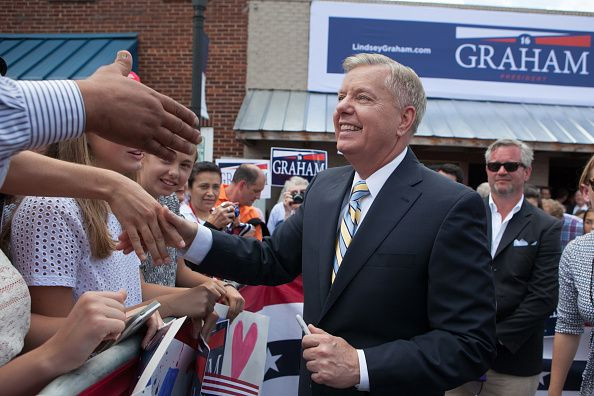Election 2016: GOP Hawk Lindsey Graham Runs Against 'Obama-Clinton' Record On ISIS, Russia

WASHINGTON -- Lindsey Graham is betting he can defy the odds in more ways than one. He enters the presidential campaign a long shot in the polls. And the South Carolina senator is running on a single issue: foreign policy -- an issue that even in times of war has rarely topped the list of voter concerns.
Most polls still say voters care more about the economy and jobs than about what is happening overseas and how the United States is involved. But Graham made his foreign policy experience and views central to his presidential campaign announcement in South Carolina on Monday. “I have more experience with our national security than any other candidate in this race,” he said.
Graham is one of a growing number of Republicans who think the path to victory in 2016 is not on the economy -- which has steadily been improving under President Barack Obama -- but on foreign policy. They test-drove the approach in 2014 with success. Republican candidates spent time on the campaign trail talking about Islamic State group militants and Ebola as much as Obamacare and the economy. And the world seems to be getting scarier, with ISIS wins on the battlefield, terrorist attacks in Europe and a general sense that the Middle East and parts of Africa are becoming less stable.
In March, the GOP commissioned a poll whose results may validate Graham's approach. The Republican firm On Message found a plurality, or 22 percent of those surveyed, ranked national security as the the top issue, National Journal reported. The survey was conducted for the super PAC American Action Network, a group that spent millions of dollars helping Republican congressional candidates and is run by allies of House Speaker John Boehner.
It runs counter to results that Gallup found in early May. That survey asked voters to name the "most important problem” facing the country today; 33 percent gave a response that dealt with the economy, including unemployment, jobs, the wealth gap, the federal deficit and taxes. Only 4 percent said national security, and another 5 percent said terrorism. Just 2 percent said foreign policy or other foreign affairs.
Despite the low numbers, it's clear that Republicans are concerned about voter perceptions on foreign policy. When Rand Paul criticized party hawks last week for supporting arms sales to groups that eventually sided with ISIS, the rest of the GOP field exploded in opposition.
But what’s not known yet is whether focusing almost solely on foreign policy is enough to win the nomination. Graham spoke for a few minutes about domestic policy at the end of his announcement, but foreign affairs dominated his speech. And many of the lines about fighting ISIS or dealing with the Middle East where he paused for applause brought only a smattering of clapping from the crowd. A member of the Senate Armed Services Committee -- which oversees the Pentagon -- Graham has been a consistent hawk and encouraged aggressive responses to foreign enemies.
“I’m afraid some Americans have grown tired of fighting them,” Graham said in his announcement. “I have bad news to share with you -- the radical Islamists are not tired of fighting you.”
But even if Graham -- or another Republican -- were to be successful in making foreign policy the focal point, waiting for them in the general election is likely to be a candidate with strong foreign policy credentials of her own. Hillary Clinton served as secretary of state for four years. And the public scores her well on the issue. A Gallup poll from mid-May found that 42 percent think Clinton would do a “good job” on foreign policy if elected. Another 26 percent think she would do a “fair job.”
Republicans are hoping to capitalize on public dissatisfaction with Obama; every discussion of White House foreign policy refers to “Clinton-Obama” policy. And Clinton's history of course provides plenty of material, like her comment about wanting a "reset" of America's relationship with Russia.
Graham didn’t miss the chance in his announcement. “We will have a reset with Russia that sticks,” he said.
© Copyright IBTimes 2025. All rights reserved.






















